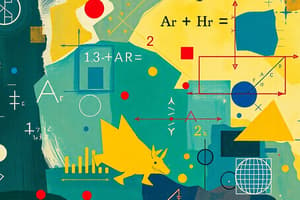Podcast
Questions and Answers
What is the first step in a mathematical problem-solving strategy?
What is the first step in a mathematical problem-solving strategy?
- Evaluating the solution
- Checking for errors
- Identifying key concepts
- Understanding the problem (correct)
Which field heavily relies on mathematical modeling to predict natural phenomena?
Which field heavily relies on mathematical modeling to predict natural phenomena?
- Computer science
- Finance
- Science (correct)
- Engineering
What does financial modeling primarily depend on?
What does financial modeling primarily depend on?
- Market research
- Computer programming
- Mathematics (correct)
- Statistics
Which step involves ensuring that the solution is logical and consistent with the problem?
Which step involves ensuring that the solution is logical and consistent with the problem?
Which of the following is NOT a strategy for solving mathematical problems?
Which of the following is NOT a strategy for solving mathematical problems?
Which branch of mathematics is primarily concerned with the study of shapes and properties of objects in space?
Which branch of mathematics is primarily concerned with the study of shapes and properties of objects in space?
What is a fundamental aspect of algebra that distinguishes it from arithmetic?
What is a fundamental aspect of algebra that distinguishes it from arithmetic?
Which concept describes a formal argument used to demonstrate the validity of mathematical statements?
Which concept describes a formal argument used to demonstrate the validity of mathematical statements?
What is the primary focus of discrete mathematics?
What is the primary focus of discrete mathematics?
In statistics, what is the primary process involved in interpreting numerical data?
In statistics, what is the primary process involved in interpreting numerical data?
Which branch of mathematics focuses on the study of prime numbers and divisibility?
Which branch of mathematics focuses on the study of prime numbers and divisibility?
What does the concept of a function represent in mathematics?
What does the concept of a function represent in mathematics?
Which mathematical statement expresses the relation of greater than or less than between two expressions?
Which mathematical statement expresses the relation of greater than or less than between two expressions?
Flashcards
Mathematics
Mathematics
The study of quantity, structure, space, and change using logical reasoning and abstract thought.
Arithmetic
Arithmetic
The branch of math dealing with basic operations on numbers (addition, subtraction, multiplication, division).
Algebra
Algebra
The branch of math that uses variables and equations to explore relationships between quantities.
Geometry
Geometry
Signup and view all the flashcards
Calculus
Calculus
Signup and view all the flashcards
Sets
Sets
Signup and view all the flashcards
Functions
Functions
Signup and view all the flashcards
Equations
Equations
Signup and view all the flashcards
Mathematical Modeling
Mathematical Modeling
Signup and view all the flashcards
Problem Solving Strategies
Problem Solving Strategies
Signup and view all the flashcards
Understanding a Problem
Understanding a Problem
Signup and view all the flashcards
Key Concepts
Key Concepts
Signup and view all the flashcards
Evaluating a Solution
Evaluating a Solution
Signup and view all the flashcards
Study Notes
Introduction to Mathematics
- Mathematics is a vast field encompassing a wide range of topics, including arithmetic, algebra, geometry, calculus, and more.
- It is often described as the study of quantity, structure, space, and change.
- Mathematics uses logical reasoning and abstract thought to solve problems and explore patterns.
- It's a foundational subject impacting nearly every field of human knowledge.
Branches of Mathematics
- Arithmetic: This foundational branch deals with basic operations on numbers, such as addition, subtraction, multiplication, and division.
- Algebra: This branch extends arithmetic by introducing variables and equations to represent unknown quantities. It allows for the exploration of relationships between variables and their solutions.
- Geometry: This branch focuses on shapes, sizes, positions, and properties of objects in space. It includes concepts like points, lines, angles, and polygons.
- Calculus: This branch deals with continuous change. It includes concepts like differentiation (rates of change) and integration (accumulation of quantities).
- Number Theory: This branch explores the properties and relationships of numbers, including prime numbers, divisibility, and modular arithmetic.
- Statistics: Concerned with the collection, analysis, interpretation, presentation, and organization of numerical data.
- Probability: Examines the likelihood and chance of events occurring.
- Discrete Mathematics: Includes logic, graph theory, and combinatorics, focusing on countable or discrete objects.
- Linear Algebra: Deals with linear equations, vector spaces, and matrices.
- Trigonometry: Applies geometrical concepts to the relationships between sides and angles of triangles.
Key Concepts in Mathematics
- Sets: Collections of objects, enabling the study of groups of numbers or other entities.
- Functions: Relationships between input and output values, mapping one set to another.
- Proofs: Formal arguments using logic to demonstrate the validity of mathematical statements.
- Axioms: Fundamental assumptions or postulates that form the basis of a mathematical system.
- Theorems: Statements proven to be true based on axioms and previously proven theorems.
- Equations: Mathematical statements asserting the equality of two expressions.
- Inequalities: Mathematical statements expressing the relation of greater than or less than between two expressions.
Applications of Mathematics
- Mathematics plays a vital role in many fields, including science, engineering, finance, and computer science.
- Mathematical modeling helps to predict and understand natural phenomena.
- Mathematical principles are essential in designing and constructing buildings and infrastructure.
- Financial modeling and analysis heavily rely on mathematics.
- Computer algorithms and software are built on mathematical foundations.
Problem-Solving Strategies in Mathematics
- Understanding the Problem: Carefully reading and interpreting the given information is crucial.
- Identifying Key Concepts: Recognizing the relevant mathematical concepts applicable to the problem.
- Developing a Plan: Devising a strategy for solving the problem, which might involve using formulas, creating diagrams, or breaking the problem into smaller parts.
- Executing the Plan: Applying the chosen strategy meticulously and accurately.
- Evaluating the Solution: Ensuring the solution is logical, consistent with the problem, and achieves the desired result.
- Checking for Errors: Identifying mistakes or flaws in calculations and reasoning.
Studying That Suits You
Use AI to generate personalized quizzes and flashcards to suit your learning preferences.




